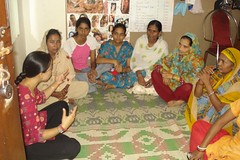
by Anuradha Bakshi | Aug 10, 2008 | Uncategorized
 If change is to truly come about, it has to be routed through women. This is something I have firmly believed and yet something that has remained elusive. When project why began almost a decade ago, one of the first things we tried to set up was a self help group for women only. The idea was to get women together around an economic activity and then try and raise awareness about burning social issues in the hope of making the group an agent of change.
If change is to truly come about, it has to be routed through women. This is something I have firmly believed and yet something that has remained elusive. When project why began almost a decade ago, one of the first things we tried to set up was a self help group for women only. The idea was to get women together around an economic activity and then try and raise awareness about burning social issues in the hope of making the group an agent of change.
My mother who was in many ways an avant-garde feminist of sorts had always held women responsible for their own plight. She reveled in pointing out that most of the crime against women was perpetrated by women themselves. The most glaring example being that of the mother-in-law daughter-in-law relationship. And she went to add that it was women alone that could free themselves and bring about change.
A two day old bay girl was found in a plastic bag near a garbage dump in Delhi last week. We seem to be the capital of abandoned baby girls. Needless to say that it is far to often women who commit this abomination: a desperate girl not wanting to hear any more taunting, or one wanting to spare another a life of ignominy or perhaps a kind soul hoping the child would find a better life. What is shocking is that this is happening in India’s capital city! The reality is indubitable: little girls are not welcome. And it is also true that women alone can make them feel wanted.
Our erstwhile women’s group failed to bring about the results we wanted. Our efforts to get women to start a small unit making healthy snacks for school children – in lieu of the few rupees given to children to buy dubious eatables – failed miserably. In hindsight there were many reasons for the failure. Women were not willing to go out and market their ware. They wanted to make the snacks for a salary. This was probably due to the fact that their husbands prompted them to do so as everyone felt that NGOs have loads of money to spare. Or maybe it was because everyone who comes to the city feels he or she has a right to a job. Hard work is a prerogative of the village. Or perhaps it was due to our lack of experience in the field. Whatever the cause the attempt failed miserably and the idea was shelved.
When we seeded our women centre it was primarily to give refuge to women shunned by society and help them rebuild their lives. But right from the very first day we felt the need to reach out to local women in the hope that some day we would be able to revive old dreams and get our women’s group going. The challenge was to be able to have them review their lives and make appropriate changes. The ploy was to first gather home around an innocuous activity like stitching. Then as time went by and bonds were created we moved on to weekly meetings around a variety of subjects and cups of hot tea! Then a series of unforeseen circumstances slowed down the momentum but some time back Rani and Shamika took on the challenge and revived the process.
Now every Thursday over a dozen women come to discuss and debate several issues and share their views and dreams. And perhaps in days to come we will be able to revive our women’s group around a new activity that all would have decided upon. It is a first step in the right direction. I hope it does live up to our expectations: that of helping women set themselves free!
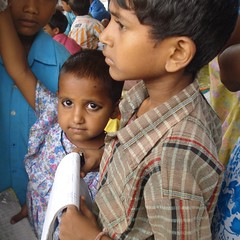
by Anuradha Bakshi | Aug 8, 2008 | Uncategorized
 The teach India campaign is in full swing, or so we would all like to believe. Our tryst with them was short lived: we did not fit the model they proposed as we could not take in the minimum of 100 volunteers that they offered – we had asked for six. The organisers could not understand why in spite of our 9 centres we were unable to accept the 100 volunteers offered. To them the maths was simple: 9 centres into 2 shifts into 6 days = 108!
The teach India campaign is in full swing, or so we would all like to believe. Our tryst with them was short lived: we did not fit the model they proposed as we could not take in the minimum of 100 volunteers that they offered – we had asked for six. The organisers could not understand why in spite of our 9 centres we were unable to accept the 100 volunteers offered. To them the maths was simple: 9 centres into 2 shifts into 6 days = 108!
We tried to explain to them that it would be terribly unfair and even disruptive to the children and their teachers to have a new volunteer each day of the week. And though they did try to pressurise us, we stood firm: the children and their well being was far more important to us than being associated with any campaign no mater how glitzy or big.
I decided to spend some time on the website of the teach India campaign and landed on their message board. I was saddened to see that there were many young volunteers waiting for a phone call that would tell them they had been selected and would assign them a teaching opportunity. The message board was replete with words like: not received a call, no reply, no call, I am disappointed, how long?????
My heart went out to these young Indians who had taken a first step towards making a difference and were waiting for the call that would allow them to do so. Some even said they had registered 2 months ago and the campaign being for 3 months I wonder if their phone will ring. There were a few lucky ones and they shared their experiences which were heartwarming. The idea is a winner and it would be a tragedy if it failed.
In the midst of all the message threads was one that brought whoops of joy: tt simply said: Can we Form a Group if teach India doesn’t call us and go ahead. For me those simple words showed that no matter how the blitz ended it had succeeded as it had ignited a sparkle in young India. Here was a group of youngsters who were not waiting for calls but simply going ahead. They had understood the real message, the one that would save and change India. One did not wait for someone else but took on the challenge and make it happen.
I sincerely hope that the thousands of would be volunteers who may not get a call will not give up but will find it in themselves to carry the torch and teach India
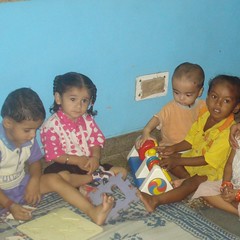
by Anuradha Bakshi | Aug 7, 2008 | Uncategorized
 When little Prakash was born we were delighted as he was a bonny baby. His mom was part of our programme for pregnant and lactating women and all seemed to pint to the fact that our three month intervention programme worked. But we were in for a rude shock.
When little Prakash was born we were delighted as he was a bonny baby. His mom was part of our programme for pregnant and lactating women and all seemed to pint to the fact that our three month intervention programme worked. But we were in for a rude shock.
Months went by and instead of thriving, Prakash began to wither. His head was the only part of him that seemed to grow, the rest his body could not keep up. His milestones were delayed and it was as if the child was vanishing. He sat in a corer of the creche, his legs folded not able to stand in spite of being 14 months old. Hi social skills remained poor and all you got from his after a lot of prompting was a toothless smile. Local doctors felt he had hydrocephalus. A series of tests were done but with no clear results. His pitiable state was heart wrenching. Not able to stand helpless we sent him to the paediatric ward of leading hospital and we has diagnosed with rickets! We were aghast as rickets is a form of severe malnutrition.
I began reading about rickets and discovered that one of its main causes is vitamin D deficiency or in other words lack of sunshine. The penny dropped. In a city where housing is a huge problem, greedy landlords have brought down their old structures, one with courtyards and sunshine, and built airless and windowless rooms where night reigns all day. When we were looking for a room for 7 month pregnant Madhu, Prakash’s mom, we found one across the street. It was dark and that is where the mother spent her last months of pregnancy and delivered Prakash. It was also there that he spent the first few months of his young life. NO matter how well we tried to feed the mother and then the child, we were unable to make up for the sun rays.
Many children are born and live in dark holes where the sun never shines. This is the price to pay for urban dreams a far cry from village life where the sun is abundant and where children spend time in the open, even as babies who are oiled and massaged and left out in the courtyard under the watchful eyes of the clan. I remember being shocked when many years back our cook brought his mother to the city for a medical check up. The woman looked very old, as all village women do, and was thin as a reed. But when her blood tests were done her haemoglobin was over 13, something rare in India. I knew the family was poor and wondered how that could be possible. he answer was simple: the family ate black millet instead of wheat flour, as the millet was what they grew in their fields, and black millet is know to be rich in iron. The family also ate lots of seasonal vegetables that grew in their yard something impossible in a city.
We will tend to little Prakash and hope he improves and makes up for lost sun. But I wonder how many little Prakashs live undiagnosed in the city.

by Anuradha Bakshi | Aug 6, 2008 | Uncategorized
 To abort or not to abort that is the question? The last week has been replete with debates and discussions on the issue. The fate of a little unborn child lay in the hands of an archaic legal system and complex medical opinions. Two days back the courts decreed that the child was to live. This is not the latest plot of some avant garde movie but a real story.
To abort or not to abort that is the question? The last week has been replete with debates and discussions on the issue. The fate of a little unborn child lay in the hands of an archaic legal system and complex medical opinions. Two days back the courts decreed that the child was to live. This is not the latest plot of some avant garde movie but a real story.
An unborn foetus was diagnosed with a congenital heart problem. The parents sought legal sanction to abort the baby though the foetus was 26 weeks old on the grounds that they would not be able to bring it up. The hospital gave vague and contradictory opinions and to crown it all there was also a typographical error that sealed the fate of this unwanted child. The case has led to an onslaught of divergent opinions and debates- a mother’s right, the right to life, the plight of disabled children in India, the lack of support systems – and the battle is still on. Help has also be forthcoming for this baby: offers of adoption and free medical care. The one question that has not been raised is why this family went public with this issue in a land where clandestine abortions are an easy option? And one also wonders whether the parents now in the media and public glare will come to terms with the situation and give this child all the love and care it needs. Only time will tell.
All the children in the picture above have congenital heart conditions and thank heavens their parents did not think of aborting them. They belong to very poor families who and yet each one of them did everything they could to ensure their kids would live. Was it their prayers or the hidden hand of the God of lesser souls, but they all found their way to our heartfix hotel where broken hearts get repaired. Today they are all living healthy lives like any other kid and though there may be problems in the future I know they will all be overcome.
In another city lies a little 9 day old. Born to a surrogate mother to a Japanese family this child is also unwanted. Her surrogate parents separated while she was still in the womb of another woman and both women do not want her. The laws do not allow a single parent to adopt so she today is nobody’s child. One just hopes that the laws will bend a little to allow this child to have a real morrow.

by Anuradha Bakshi | Aug 3, 2008 | two indias
 India is undoubtedly shining or should I say sparkling, albeit for a handful. A news item aired yesterday confirmed just that. A leading florist chain has tied up with an international floral couturier (did not know that they existed) and will bring to the ever richer and never sated Indian customer a new extravaganza: flowers decors designed by the master himself at a whopping 2 to 4 crores!
India is undoubtedly shining or should I say sparkling, albeit for a handful. A news item aired yesterday confirmed just that. A leading florist chain has tied up with an international floral couturier (did not know that they existed) and will bring to the ever richer and never sated Indian customer a new extravaganza: flowers decors designed by the master himself at a whopping 2 to 4 crores!
I must confess it took me some time to digest this. I must admit that I am one of those who find even the present weddings too ostentatious and even immoderate. I have for quite some time now stopped attending them as I find them disturbing and wasteful and devoid of any sanctity. For my own child’s wedding I decided to walk the talk though I must confess it did not go down well in a city where big is beautiful.
2 to 4 crores or 20 to 40 million rupees spent on floral decor is something I cannot begin to understand. The next day the flowers are wilted and simply swept away. Bye bye crores and the millions. Is it a way of showing who you are or simply a game of who spends more or comes up wilder ways of spending money? I do not know. Does it reflect a sense of insecurity that can never be revealed? I again do not know. And where it will end? It is any one’s guess.
Till a few months a core was way out of my league. I was imply battling trying to garber the few laks (1/10 of a million) needed to run pwhy. I only became aware of the value of a crore when we set up on the planet why journey. And even more recently the word crore has cropped up often as we debate the costs of construction of planet why. Yes planet why which will have: a guest house with 10 rooms, space for over 50 deprived children, special children and women to live with dignity, space for hundred to come and learn and pwhy to survive and will also be a zero carbon building does not come up to the price of one such wedding. It simply needs 1.8 crores.
Yet for us this figure is so daunting and immoderate that we wonder where it will come from. Just the price of a designer wedding, actually not even that as the 2 to 4 crores are only the cost of the decor!
I must again confess I am still trying to come to terms with this.
PS: the picture of this priceless flower was taken by our hotshot lensman Utpal!
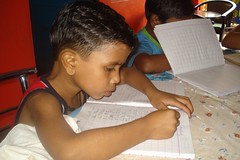
by Anuradha Bakshi | Aug 1, 2008 | common school, two indias
 There is a new buzz in town: teach India, the latest campaign by a leading newspaper group. Larger than life posters, glitzy TV ads, Bollywood brand ambassadors, a dynamic website, heart rendering memories: the stage is set to make India literate, or so the well designed and implemented campaign would want us to believe. As an NGO who has been in the teaching business for almost a decade we qualified as partners and I received the concept note of the campaign.
There is a new buzz in town: teach India, the latest campaign by a leading newspaper group. Larger than life posters, glitzy TV ads, Bollywood brand ambassadors, a dynamic website, heart rendering memories: the stage is set to make India literate, or so the well designed and implemented campaign would want us to believe. As an NGO who has been in the teaching business for almost a decade we qualified as partners and I received the concept note of the campaign.
Amongst other things the teach India wants to : Inspire, motivate and mobilize people to volunteer for education and be more socially active citizens and build a more cohesive and inclusive society based on trust and reciprocity through bridging people from different backgrounds in order to fight discrimination and marginalization. Is this not what many of us have been wanting and trying to achieve for a long long time.
The campaign like every other media campaign is short: 3 months, at the end of which a monitoring process will begin to check the impact of the classes and the efficacy of the program. Wow, wish things would be that easy.
My mind went back a few years to the time when we too at pwhy had tried to inspire, motivate, mobilize people to be more socially active. I remembered the day when after having been in the glare another media campaign, replete with glitzy ads, Bollywood stars et al, I had sought help for our just one rupee campaign, where we did not ask for two hours of any one’s time, but just a simple rupee a day to teach India! The fact, as I realised just a few minutes ago, that I have even removed the campaign form our website, speaks for itself. The idea failed, no one was mobilised, inspired or motivated. A handful did come forward but the impact of such an option could only be felt if it withstood the test of time and became part of one’s life, almost like an old and bad habit!
For months I tried to flog the dead horse but soon realised it was mission impossible. I did many a post mortem but must admit could not find one valid reason that perhaps could have been addressed. There were many: people got bored and tired of one cause and wanted new ones; people preferred spending their money to help dramatic and heart rendering causes: a heart surgery, a tsunami…or simply coming with packets of food and feeding poor kids! Things had to be visible and the only visibility one could proffer were pictures of kids learning, exams results or some passionate blogs. Not enough to keep them interested and have them make the effort to remember the next month’s or year’s cheque. I had failed to motivated, inspire, mobilise people to give a simple coin, one that would not even been missed.
Soon the just one rupee a day dream was set to rest without much ado. But the teach India campaign bought it all to the fore and for more reasons than one. If India is to change for the better we all have to accept and assume our part of responsibility and cannot simply hope that government policies and a handful of committed NGOs will do the magic. And though the teach India campaign has all the right ingredients for success why is it that I feel that it will just wane away after the blitz is over. Am I simply getting jaded and tired.
It would be terribly unfair to a bunch of people from different walks of life if I ended my post here leaving all and sundry to believe that no one can get mobilised, motivated, inspired. We have been in the teach India business for almost ten long and exciting years and can boast of great track record (no failures in school, good results in Boards, kids gainfully and well employed) and this is because we managed to find, mobilise, inspire, motivate a great bunch of human beings that form what we proudly call the project why team! We did not have media campaigns, Bollywood stars or any such drama, we simply spoke to their hearts. Our teachers do not have swanky degrees or MNC jobs. They are simple Indians with a few years of schooling and loads of common sense. They belong to the strata we normally fail to acknowledge and often pass by. They are rich in commitment and goodwill and give themselves wholeheartedly to the work entrusted to them. And boy they do it well. To them all I can say is chapeau bas!
Over the past years they have been helped by another bunch of rare beings that go by the name of volunteers. They come form faraway lands: Singapore, France, the US an UK, Italy, Germany, Holland and other lands. They come from famed Universities and Business Schools. They are your would be honchos. They brave the heat, the stench, the mosquitoes and the spicy food and spend what is often their holidays teaching India. They do not need media campaigns to motivate, inspire or mobilise them: they simply follow their heart. To them again chapeau bas!
Teach India is undoubtedly a brave campaign which we would want to believe has been launched for all the right reasons. Its success depends on each one of us and our ability to carry on after the limelight has faded away.
You can see how we at pwhy teach India by flicking through these pictures.
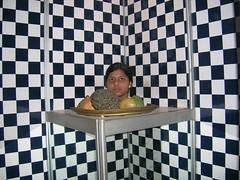
by Anuradha Bakshi | Aug 1, 2008 | okhla
 About 40 pwhy kids were in for a huge treat last week. Our very special Sari Kids had planned an outing for them and they were all to visit the science centre. A big bus had been booked and kids from the Okhla centre and the women centre were the chosen ones. They were a motley crew of primary kids and giggly teenagers. A handful to say the least!
About 40 pwhy kids were in for a huge treat last week. Our very special Sari Kids had planned an outing for them and they were all to visit the science centre. A big bus had been booked and kids from the Okhla centre and the women centre were the chosen ones. They were a motley crew of primary kids and giggly teenagers. A handful to say the least!
The bus left pwhy at the appointed time with the 20 odd primary. First stop Madanpur Khader to pick up the women centre’s kids. Then destination was to be the science museum at Bengali Market but by some quirk of fate the party landed at the science centre in Pragati Maidan. The day as described by the Sari kids in their blog seemed worthy of a Marx Brothers film!
It was a day of discovery for everyone. The normally quiet secondary girls of the women centre suddenly got morphed into giggly and pesky teenagers as soon as they boarded the bus in their Sunday clothes and high heels on which they would wobble the whole day. The first hurdle was the ride up the escalator. It was a mild shock for their hosts who come from a land where escalators are as normal as the air you breathe. Here it was a yeoman’s task to get these kids to take it, and though some managed with a little help from their sari pals, for the others the escalator had to be stopped. Blissfully we were in India where this can still be done.
Next stop the 3 D film with its snakes, rats and skeletons that have the required effect: shrieks and violent gesticulating from all. Tome for a few science experiments that all enjoy and then it is lunch time. The cafeteria offers only a limited choice. The smaller kids eat to their hearts content but the pesky ladies perk their nose up live their hosts flummoxed. Ultimately after a little coaxing, they are left to their antics. Needless to say they got reprimanded later and did apologise for their abysmal behaviour.
Sated with images and experiences an exhausted lot takes the long ride back. But there is more in store. Just as the bus is about to reach the women centre the skies open and a huge downpour greets them. Every one returns to base drenched in water and emotions that will be awhile going.
You can share some of the moments of this memorable trip.

by Anuradha Bakshi | Jul 30, 2008 | Uncategorized
 On my drive back from the project I was accosted by a beggar woman at a red light. As I travel in a three wheeler, I cannot roll up the window and look away. And anyway I never do, as I cannot forget the words of a beggar woman of yore years that were perhaps one of the greatest lesson of my life.
On my drive back from the project I was accosted by a beggar woman at a red light. As I travel in a three wheeler, I cannot roll up the window and look away. And anyway I never do, as I cannot forget the words of a beggar woman of yore years that were perhaps one of the greatest lesson of my life.
The woman held a small baby girl in her arms and almost thrust it in the vehicle. The child seemed to be asleep but one look at it made you realise that the sleep was induced and the child drugged. His head flopped backwards and is body was flaccid. As I was not carrying any eatable, I gently asked the woman to move on. The light turned green and we went our way.
For the past few weeks I have also been disturbed by a little 2 year old who lives close to our computer centre. She has recently come from the village and is the daughter of a rather elderly man know for his anti social activities in his home state and who often comes to Delhi to escape authorities. His wife is illiterate and live sin constant fear of her husband who is to say the least quite a terror. This little girl is their second child, he first being handicapped and let in the village. We did try to convince them to send the child to the project, but in vain. The little girl spends her days on the street in front of her house or in the homes of neighbours who often shoo her away.
I wonder what the future holds for these two children of India. Actually one need not wonder, one easily guess their future. The beggar child will soon be tugging along her ‘mother of the day‘ (as the woman may have simply hired it), and as soon as she is a little older will be the one knocking at car windows. As she grows older she may be even given a pair of crutches. One day she will be married off and may be the one holding her baby and begging.
The little girl from the slum does not have a brighter future. She will follow the her uncaring parents from village to city to village. She will never attend a school or get an education. She will never have friends, or toys and one day when she is barely pubertal will be married off to some older man just as her mother was and will produce other children who will have the same fate as her.
The tragic part is that there is nothing much one can do as these children belong to strong mafia like social groups that are totally impervious to change. And yet they become a challenge that one needs to address. The question is how!

by Anuradha Bakshi | Jul 30, 2008 | sustainability
 Yesterday I was interviewed by the Sari Kids. It was for the film they are making on pwhy and that they plan to show to their friends and peers in business school when they got back. The film is replete with images and cameos of their month long stay with us and they of course, wanted me to give a brief account of what one could call the project why story: its inception and genesis, its achievements and failures and above all its dreams for the future.
Yesterday I was interviewed by the Sari Kids. It was for the film they are making on pwhy and that they plan to show to their friends and peers in business school when they got back. The film is replete with images and cameos of their month long stay with us and they of course, wanted me to give a brief account of what one could call the project why story: its inception and genesis, its achievements and failures and above all its dreams for the future.
I must admit I am always uncomfortable in front of cameras as most of the times one is unclear about the real motivation behind the shoot. But this one was different as we sat comfortably talking about pwhy. The camera just sat unobtrusively on a table and was soon forgotten. And what was intended to be a twenty minutes interview turned out to be an hour long chat with friends, notwithstanding the age difference!
It was easy to share the pwhy journey with these wonderful kids and I found myself talking of the very personal journey that was at the origin of pwhy, not needing to circumvent or colour any event for fear of having them misinterpreted or used without he proper context. The story was much the same as the one too oft recounted, but somehow this time it seemed much truer and heartfelt as they words flew uninterrupted. There was no pressure, no time schedule, no pointed questions, no drama. Facts followed each other, interspersed with personal comments and pointers. And for the first time I saw how almost picture perfect the pwhy story was. We had actually and with a reasonable amount of success met every challenge thrown our way and were in more ways than one ready to face the ultimate one: that of making pwhy sustainable.
The lights went out, the camera was switched off and yet for a long time I sat lost in my thoughts trying to make sense of all that had been said. The disturbing question left unformulated still in my mind: had the journey been worthwhile?
The words of Forest Witcraft came to my mind: “A hundred years from now it will not matter what my bank account was, the sort of house I lived in, or the kind of car I drove…but the world may be different because I was important in the life of a child.”
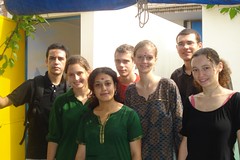
by Anuradha Bakshi | Jul 25, 2008 | fostercare, okhla
 For almost a month now, project why has been touched a very special brand of love. Almost a month ago seven bright students from a leading business school in Paris landed on our planet brimming with enthusiasm and energy. Sofia, Aude, Anais, Matthieu, Aymeric, Jessica and Carlos are members of SARI, an association aimed at extending support to organisations in India. This year project why was the chosen one!
For almost a month now, project why has been touched a very special brand of love. Almost a month ago seven bright students from a leading business school in Paris landed on our planet brimming with enthusiasm and energy. Sofia, Aude, Anais, Matthieu, Aymeric, Jessica and Carlos are members of SARI, an association aimed at extending support to organisations in India. This year project why was the chosen one!
I must confess that I was a little apprehensive at first as this was the very first time we were hosting not one, not two but seven volunteers at a time. But somehow the warmth of the emails they sent and their deep commitment was enough to bowl us over.
This unique bunch of kids is not your run of the mill business school scholar. They are kids who have learnt to see with their hearts at an age when most of their peers are busy with mundane pursuits. For the past months they have been busy preparing their trip and have spent many a week ends and holidays fund raising for us: baking cakes and Indian pies or taking up sundry chores, they just did everything they could think of.
For the past month these incredible kids have been battling the odds that awaited them with grit and determination: the heat an dust, the mosquitoes, the power cuts, the over spiced food, the language problem and above all the cultural shock. And frankly nothing can prepare anyone for slum India! I guess many of our own people would find it difficult of not impossible to spend one or even half a day there. But these brave kids soldiered on and after a difficult first week each one of them found their place in project why. And what was even more remarkable was the fact that they even slept in turns at the foster care where life is rudimentary by all standards, a place where I must confess, I would not find it easy to stay.
In the day they each went their way, some to teach at the women centre, others to play with the kids in the creche and still others to Okhla which is by far our most forbidding centre. Questions abounded in their minds and perhaps we were not able to answer them all. It is much easier to deal with an individual than a group and we realised we too had a lot of learning to do. Many things remained unsaid though they were deeply felt by all of us. We would have liked to be able to reach out and interact much more than we actually could.
By the time they leave, the SARI group as we fondly called them, would have left their indelible mark in our hearts. But that was not enough for them. The last week was spent on a huge shopping spree: school bags for the kids at the women centre who use plastic bags in lieu, oodles of mats to replace the threadbare ones, white boards and even clothes for little GyaniChu. But the biggest gift all is the money given to rebuild our Okhla centre that was literally blown apart. The SARI kids will be fondly remembered by each one of us. They conquered our hearts in their own way.
I have often said that I am busy being grateful. And once again I find myself filled with the same overwhelming sense of gratitude. I realise that I often fall short of saying the two sated words: thank you as they cannot even begin to express the depth of my feelings. Perhaps I should use them more often.
There is another thing that the SARI kids have done and that they not are even aware of. They have vindicated a dream of mine, one that I wish I could see happen with their peers in India. I am convinced that India could change for the better if young people from good homes and leading institutions found the time and the commitment to reach out to the less privileged. I wonder whether that day will dawn while I am still around.
Yes our SARI kids will be in our hearts for a long time. I hope they too will remember us and forgive our shortcomings if any. What they did is something they can truly be proud of. And in a land where the divine rules, we will pray that God grants them all that their heart desires.
You can share some of the special moments of their visit here:
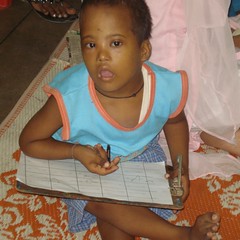
by Anuradha Bakshi | Jul 24, 2008 | Uncategorized
 “The sun illuminates only the eye of the man, but shines into the eye and the heart of the child” wrote Ralph Waldo Emerson. How true he was.
“The sun illuminates only the eye of the man, but shines into the eye and the heart of the child” wrote Ralph Waldo Emerson. How true he was.
A few days back a little ray of sunshine entered our world. Pooja is 7 year old and has Down syndrome. Since she joined our special section nothing is quite the same. Pooja is an endearing soul and like all kids with trisomy is extremely affectionate and warm. She took no time in making a place for herself in the hearts of each and everyone. She is filled with mischief and a bundle of activity but someone no one seems to mind. Even the most taciturn of the lot cannot help but smile at her antics.
A few days back she commandeered poor Geetu’s lunch box hours before lunch time and decided to eat it. The normally prim and proper Geetu who is a tad possessive about her lunch simply smiled and even fed her. Pooja has still not accepted to follow the time table and the staff too indulges her so she makes her won day and decides who to sit with to what to do. Sometime she is seen practicing writing skills with the more advanced lot, or she decided to butt in puzzle making time of the other group and with a flick of her hand and a mischievous smile destroys the carefully constructed puzzle. What is amazing is that even Anurag who normally would throw a fit, simply smiles at her and sets out to rebuilding his puzzle.
We know that Pooja will soon settle. But what is amazing is the way in which her classmates have accepted her and made her one of them. The motley crew that makes up our special section is normally quite a handful each with their complex behaviour and mood swings. But somehow with this little bundle of joy, they seem to have set all aside. Is it because they intuitively know she needs their support and love. My little special kids never cease to amaze me. Evey day in their own unique way they teach me invaluable lessons to cherish.
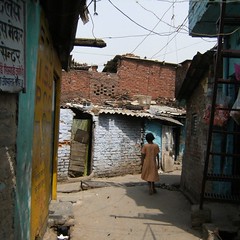
by Anuradha Bakshi | Jul 23, 2008 | Uncategorized
 The parliamentary debate on the confidence motion trust was a gloomy moment for all self respecting Indians. I will not delve into the matter as enough has and is being said. I followed bits and pieces of the day long saga with dismay, horror and immense sadness. Less said is better. I simply chose to mention a brave speech, that of Rahul Gandhi and who was heck;ed all the way.
The parliamentary debate on the confidence motion trust was a gloomy moment for all self respecting Indians. I will not delve into the matter as enough has and is being said. I followed bits and pieces of the day long saga with dismay, horror and immense sadness. Less said is better. I simply chose to mention a brave speech, that of Rahul Gandhi and who was heck;ed all the way.
Again I am not one who condones nepotism and dynasties nor am I a sycophant. What got my attention in this speech was the fact that perhaps it was the only one that referred to the other India in a humane and real way. When RG spoke of Kalawati, he gave a voice to the hundred of millions of faceless and voiceless Indians.
There are Kalawatis everywhere. People who live a hand-to-mouth existence in a land that is becoming more and more indifferent to their needs.They pass by us so quietly that we never see let alone acknowledge them. Yet many are the warp of our very existence. And even if they do not impact us directly they are the lifeline of those who make our lives more comfortable. I am talking about the man who sells hot food to the construction worker, the man who sells handkerchiefs, socks, and cheap ware on road sides, the one who sells plastic toys a father will take back to his child at the end of a long day.
Imagine the plight of such people as they set off every morning, weather notwithstanding, with their bundle, or cart not knowing whether they will be able to bring back sufficient money to feed the family for the next 24 hours. No one buys kerchiefs or head scarves every day! And every day the same amount of rupees buy much less food. Every week we make the appropriate sounds of dismay as we are hear the new inflation figures on our slick TVs in the comfort of our air conditioned room. Yet the size of our weekly basket barely suffers. For the Kalawatis across India the story is different and it is time that we took notice. I guess that is what RG wanted to do. But did we? Or should I say did those that matter notice. We all know the answer. they were too busy playing to the world gallery and bringing shame to each one of us.
I do not know whether the nuclear deal is good or not. I do not know whether RG’s speech was a clever political gimmick or one from the heart. I only know that it brought to the fore the reality of millions of our own country mates. I wonder how many of us can even begin to imagine what such a life means. I must admit that I too was one of those living in absolute denial. Pwhy changed all that.
I see the how inflation and price rise affects the common Indian in the lunch boxes of children everyday. I see it in the eyes of a child burning with fever who was not taken to the doctor for want of money. I see it in the backs that seem more bent and the gaits that have lost their spring. Can you imagine what goes on in the mind of a woman as she waits outside her home late in the evening, her kitchen fire cold, her vessels empty and her children hungry, waiting for her husband to come back with the the handful of rupees that will buy a meal and praying furiously that he does not stop by the watering hole. There are many such women and they live but a few stones throw away from us.
Have we all lost our conscience, or have we simply lost our ability to feel. Are we so lost in hubris that we are unable to see what is happening around us. I do not know. I just feel here is something terribly wrong. In all the hullabaloo of the parliament tamasha I just heard the silent deafeaning voice of Kalawati
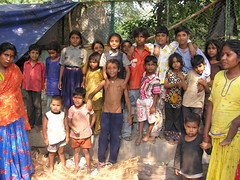
by Anuradha Bakshi | Jul 20, 2008 | two indias
 The rise in the crime graph of our city is cause of concern. Delhi today is a megalopolis. With 13 million inhabitants in 2001, we must now be hovering around 18 million, thus being the most populous city. 700 new migrants arrive each day and 600 babies are born every day. By 2015, Delhi is expected to be the second largest agglomeration in the world after Tokyo.
The rise in the crime graph of our city is cause of concern. Delhi today is a megalopolis. With 13 million inhabitants in 2001, we must now be hovering around 18 million, thus being the most populous city. 700 new migrants arrive each day and 600 babies are born every day. By 2015, Delhi is expected to be the second largest agglomeration in the world after Tokyo.
In 2005, (according to the wikipedia)Delhi accounted for the highest percentage (16.2%) of the crimes reported in the 35 cities in India with populations of one million or more. The city also has the highest rate of crime against women (27.6 compared to national average rate of 14.1 per 100,000) and against children (6.5 compared to national average of 1.4 per 100,000) in the country.
Not pretty statistics! And the list goes on: over 8% of Delhi’s population lives below the poverty line and many more barely survive. The galloping inflation rate is just making it worse. The city is bursting at its seams but no one seems to be aware. Quite the contrary. What is visible is a frenzied growth that defeats all logic: new malls, roads, buildings, housing colonies. each requiring its pound of flesh (read electricity, water, hospitals et al).
Whereas for some life is shining (to use a now well known and sated expression) for others it is getting worse by the day and in the wake of this crime is on a spiraling rise. And why not, as hopes and dreams larger than life grow illogically fueled by images and campaigns. The past days has seen the birth of bikers gang and they are on a rampage. The mood is one where everyone wants his place in the sun now and at whatever cost.
The police and authorities are and will remain helpless as they can only intervene after the act. What is needed is to try and comprehend why this is happening. I was recently introduced to the Capability Approach mooted by Amartya Sen and Martha Nussbaum that aims at evaluating social states in terms of well being (welfare) rather than resources (income, assets). Though I am still in the process of understanding this approach, what strikes me is the fact that we often tend to equate poverty simply to absence of money and everyone particularly the deprived is convinced that access to money will resolve all issues.
In the line of such thought the recent access to credit that the poor now have courtesy multinational banks and their financial franchisees, is just adding to the mess. In their frenzied attempt to rope in more and more consumers, such institutions bypass rules for a pocketful of coins. A happy individual gets his loan without understanding the real implications and the seeds of disaster have been sown. Bikes and cars now abound in the narrow lanes of Delhi’s slums. TVs blare in each and every home peddling dreams and false hope. Everything seems possible in this new India which seems to shine for all. What one tends to forget is that for some the sparkle is illusory.
In this almost hubristic environment where even Gods need to be defied, crime proliferates. Reason has been sacrificed at the alter of desires and wants. The shining India beckons all. Education that could have applied a moderating influence has also been hijacked along the way. At one end it reiterates the message of plenty whereas at the other it reinforces the reality of its absence. Moderation, temperance, patience are virtues of another era.
Times are ripe for all kind of short cuts, crime being one of them. Our society is truly sick and it is time we addressed the situation and found the elusive remedy.

by Anuradha Bakshi | Jul 17, 2008 | Uncategorized
 I normally do not watch TV in the early evening. I was busy with the usual evening chores and had to go to my daughter’s room. The TV was on. A local metro channel diffusing its evening news. I was about to mouth the question I had come to ask but was stopped short as I heard the voice of the newscaster recounting an incident where a young girl had been humiliated in a nearby suburban school. All chores forgotten I just watched.
I normally do not watch TV in the early evening. I was busy with the usual evening chores and had to go to my daughter’s room. The TV was on. A local metro channel diffusing its evening news. I was about to mouth the question I had come to ask but was stopped short as I heard the voice of the newscaster recounting an incident where a young girl had been humiliated in a nearby suburban school. All chores forgotten I just watched.
A young girl had been punished by her teacher for not being up to the market in class. The teacher who seemed to belong to some ante deluvial time had chosen to write in black soot across the face of the child the following words: I am not good in my studies, and then paraded the child across the school. The teacher of course had threatened the girl of dire circumstances were she to tell her parents about the incident. The young girl had not murmured a word. However the next day she had refused to go to school. Seeing the angst on her face the parents coaxed the child to reveal what was wrong. She ultimately did.
The parents went to the school authorities and the police playing the scene according to script. The teacher was suspended and further action may follow but will and can it wipe of the hurt the child suffered, the invisible scars seared on the girl’s soul that no one can see let alone heal. No matter what punishment will be meted out to the erring school teacher, no matter the profuse apologies tended, no matter the words proffered to sooth the hurt child, the harm is done. This young girl will bear the hurt of this humiliation for a life time. It may be forgotten in good times, if good times there are but will come back to haunt her each time life poses a problem. Public humiliation is by far one of the worst form of retribution, one that cannot be meted out to a child by anyone, let alone a teacher.
This incident makes one go back to Dickensian days of Dunce tables and Dunce caps. Lot of water has flowed since those days or so we thought. But an occurrence like this one makes us wonder whether times have truly changed.
But if that was not enough another horror that befell a tiny 9 year old came to light. A little class IV girl had been raped in the toilet of her school in broad daylight. As I write these words the follow up drama is in full swing. Enquiries, suspension, political condemnations, financial assistance and the much sought headlines. But my heart goes out to the little girl who has been scarred for life. Such incidents leave deep lifelong invisible scars not only on the body but on the soul of the victim. And if that was not enough, one must not forget that we live in an insensitive and biased society where far too often the victim is made to feel guilty.
I can only once again recount the plight of C, now 17, a past student of ours who was raped at the age of 4 by a neighbour. The rape was so violent that the child had to have a hysterectomy. The rapist did his time in jail. C grew up but . As a teenager she found herself ostracised by her peers and their families and labeled as the girl who had been raped.
Child rape is something abhorrent. I have no words to condemn it as everyone falls terribly short of what I want to express. I cannot begin to understand why an adult feels the need to violate a child. I look helpless at the impotent laws that far from protecting the victim seem to benefit the perpetrators with impunity.
In all the hullabaloo that normally follows incidents like the ones above, two little girls are suffering in silence. And no one seems to be concerned. They belong to homes where child psychology and post trauma stress are unknown. They belong to families who are simply busy surviving. They will have to find their healing alone, if healing there is.
At this times one can but remember the words of Herbert Ward: “Child abuse casts a shadow the length of a lifetime.”
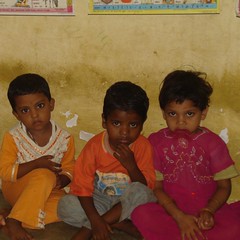
by Anuradha Bakshi | Jul 15, 2008 | okhla
 A single day is enough to make us a little larger or, another time, a little smaller said Paul Klee. We must be blessed as each day at pwhy make us feel more than a little larger though we sometimes do not take time to realise this. I often get emails reminding me that I have not shared the day-to-day happenings of project why and I must admit I stand guilty.
A single day is enough to make us a little larger or, another time, a little smaller said Paul Klee. We must be blessed as each day at pwhy make us feel more than a little larger though we sometimes do not take time to realise this. I often get emails reminding me that I have not shared the day-to-day happenings of project why and I must admit I stand guilty.
The past months have been hectic in more ways than one and somehow one simply forgot to pause and savour the incredible satisfaction that comes from just watching the on goings of a day at project why. Today let us do just that
Come 8.30 am and pwhy is already buzzing with activity. It is the time when staff drops by the tiny office perched on the second floor of our little building. Time to sign the attendance register and say a quick hello before rushing to the workplace. For some it is simply a few steps away, for others a walk or even a bus ride. It is immensely satisfying to watch our little team take off with confidence and purpose and to remember that once not so long go most of them were barely surviving. These days are a tad special as we have lots of volunteers, each assigned to various posts and thus each teacher also takes his or her volunteer along. Another occasion to give one a pat on the back as one sees people that nothing links together – neither land, nor language- walk off together often deep in conversation. I would give a hand and a foot to be privy to those instants.
While all this is going on the shrill horn of the first three wheeler bringing the children is heard. It is the merry band of the special section that has arrived. Its is heartwarming to watch them as they scuttle out of the tiny vehicle, each one helping the other. Soon the room on the ground floor is buzzing with activity as bags are kept away and mats set out for the first activity of the morning: exercises. Very often the children of the special section launch their day themselves as their routine is well set and they are a very independent lot.
A wail is heard on the first floor heralding the arrival of some tiny tot in the creche. It is amusing to see some kids insisting on crying their hearts out as they are parted form their parent not matter how long they have been attending the creche. Needless to say that the wail turns into a huge giggle moments later as they find their friends and toys. The next hour or so sees the same pattern as kids keep arriving. Soon the second three wheeler reaches and over twenty toddlers spill out of the small vehicle. It is always a delight to watch them as they patiently wait for their bags or for the lost shoe! Some time later the air is filed with song as the little ones settle to their morning routine.
Across the street in the two tiny rooms we have hired the older toddlers begin their day too. Their little desks and chairs are laid out and they soon are busy pencil in hand and tongues poking mastering the letter of the day. In the room next door the boys of the junior secondary have also arrived and are intently following the subject of the day.
At some distance the three primary centres of Okhla, Govinpuri and Sanjay Colony have also begun their activities each following a well set routine under the guidance of their set of teachers. And still further away the creche and primary and secondary classes of the women centre are also underway as are the secondary classes and the computer centre. Morning has begun at project why.
All this may seem terribly unremarkable and one could wonder why one is making such a fuss about it. I agree that at first sight there is nothing extraordinary about a bunch of teachers teaching a bunch of kids. But here again I ask you to see with your hart and not your eyes. Most of the kids you see be it in the special section, or in the creche or even in other classes are not your regular kid next door. They come from extremely deprived backgrounds and for them pwhy is a haven in more ways than one. It is perhaps the only space where for a few hours they can be just children.
For the older children pwhy is the place where they can actually learn all that is left untaught in school and thus aspire to make it to the next class and then the next and thus one day be able to get the much needed school leaving certificate and maybe aspire to a life a tad better than the one lived by their parents.
And thus as a seemingly commonplace day goes by, lives are being slowly and quietly transformed.
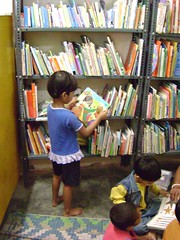
by Anuradha Bakshi | Jul 14, 2008 | Uncategorized
 A room without books is like a body without a soul said Cicero over two thousand years ago. Belonging to a generation where books were possibly our only real entertainment I readily second that. Then over the years, books played second fiddle to the new entertainment star the TV and then slowly third fiddle till they were relegated to the back row of the orchestra as an instrument barely played let alone heard.
A room without books is like a body without a soul said Cicero over two thousand years ago. Belonging to a generation where books were possibly our only real entertainment I readily second that. Then over the years, books played second fiddle to the new entertainment star the TV and then slowly third fiddle till they were relegated to the back row of the orchestra as an instrument barely played let alone heard.
I must admit that I never stopped reading though I must also confess that I was not able to instill this passion in others in my family. I lost the battle to the ever growing presence of the idiot box and its various courtesans – namely the remote control, the VCR, VCD and all else. Book reading for many just seemed a chore and a bore.
When project why began and before I was initiated to the reality of the school scenario in India, I had wanted pwhy to be a place where children could come after school and spend quality time. One of the things I wanted in pwhy was a library with an abundance of books so that children could be made aware of the magic of the written words. Like Skinner I too believed that we shouldn’t teach great books; we should teach a love of reading, as therein lay true education. But soon enough the dream of pwhy being a children centre replete with books, toys and games took a back seat as we were faced with alarming drop out rates, failing in school and the uncompromising abhorrence of parents to creative pursuits.
Reality moulded us into a school support centre where creativity had scant place. Books were only those taught in school and the few that found their way sat quietly in some dark corner, too few to make their presence felt. Even when we felt the need to have books – for the smaller kids at least – the cost itself ensured that there was never a book per child. The dream I once had seemed farther then ever.
Then one day a few months back I received an email from Willy of the Omprakash Foundation. It was I must confess mind boggling as it talked of sending tens of thousands of books to several projects in India and sought my help. And though the task was daunting and way off our beat, the fact that it concerned books made me accept readily. I guess that if it had been clothes or something else, I would have beaten a hasty retreat!
What followed was a journey into uncharted territory, one that was sometimes quite harrowing as we battled administrative and other blocks. But one did not give up and last week the consignment reached Delhi. Thanks heaven our friends from Omprakash Foundation were there too and afer some minor and sometimes amusing hurdles we at project why got not one, or ten or even hundred but twenty thousand books!
Though many still lie in boxes waiting for space, each of our centres now has books, either on a shelf when space permits or in a trunk and the children are for the first time in their lives discovering the magic of holding a book. It has been pure magic as they dive onto the trunks and retrieve books then go about flipping pages. The excitement is palpable whatever the age as they share what they see or even fight for a particular one. The teachers too are excited and planning new activities around they newly acquired treasure.
I watched all this with a sense of satisfaction and some glee. Somehow a long forgotten and almost lost dream seemed once again possible. The presence of so many books had suddenly made my dream of a children centre possible. It was time to fine tune the idea.
Ther soon will be a weekly library period in the time table. I remembered Willy telling me that in his school there was a moment called DEAR (Drop Everything And Read). Perhaps we too will have that at pwhy some day.
Some time back a friend sent me link about a new library fad whereby you borrowed a person not a book. Somehow it did not seem exciting to me. I also remember how moved I had been by Fahrenheit 451 the brilliant Truffaut film about a world without books. For me books remain a very important part of my life and high up on the list of my favourite things.
I hope that now they can also become part of the lives of the project why children.
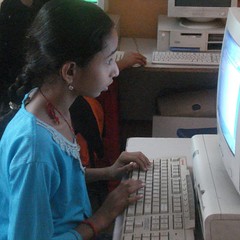
by Anuradha Bakshi | Jul 11, 2008 | Uncategorized
 A news item on a leading TV channel caught my eye yesterday. In spite of girls performing better in schools at every level, the number of girls joining the English medium stream in local government schools is still small. The reluctance according to a secondary school principal comes from the parents. In spite of the fact that their daughters have good marks, parents are often disinclined to see them join this stream. On the other hand they are insistent upon their son doing so, even if his performance is poor.
A news item on a leading TV channel caught my eye yesterday. In spite of girls performing better in schools at every level, the number of girls joining the English medium stream in local government schools is still small. The reluctance according to a secondary school principal comes from the parents. In spite of the fact that their daughters have good marks, parents are often disinclined to see them join this stream. On the other hand they are insistent upon their son doing so, even if his performance is poor.
Another sad tale of gender bias that seems to pervade every inch of our social fabric. Though reasons for such a behaviour were not spelt out, one can easily guess them. Girls are simply meant to be married and the less they know the easier things become. Too much education may just make them too difficult to handle.
Gender bias in present in each and every moment of a girl’s life, even before she is born. The sex ratio figures are ample proof of the number of girls that are denied the right to be born. It is believed that over 24 000 girls go missing every year in India’s capital city. And even after they are born girls do not get the same deal as their male siblings. I have often written about the plight of the girl child as about possible ways out. I have often felt at a total loss when in spite of all our efforts we have been unable to help a girl child. I have often sunk into despair at the deafening whys that have no answers.
We have over the past years tried to convey to parents that there is no difference between a boy and a girl but it seems that things have not changed. As I write these words I ask myself whether really have the right to proffer words of advice knowing that the reality on the ground has not changed. Girls are still considered a millstone as they need to be married and marriage costs more than one has. I refuse to believe that girls are not loved per se. It is the social burden that the presence of a girl in the family entails that causes people to shun the. Or to look at the coin from the flip side it is the lure of what a boy can bring in that makes people want them.
The bottom line still lies in changing customs and mores. Easier said than done. Customs and mores are deeply ingrained in our atavistic past. To change them requires not laws and sanctions but perhaps intervention from religious heads and social leaders. It also requires every one to walk the talk. Till then little girls will not get the same education, the same clothes, the same food or the same care as the one given unabashedly and without restraint to their male siblings.
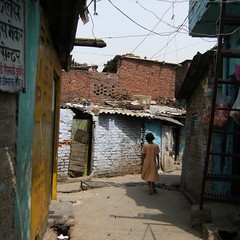
by Anuradha Bakshi | Jul 10, 2008 | Uncategorized
 Saving the planet is a fashionable conversation piece. It has been so for quite some time. Yet how many of us walk the talk? To once again use Don Rittner words: “Trying to save ecosystems has more to do with changing egosystems.”
Saving the planet is a fashionable conversation piece. It has been so for quite some time. Yet how many of us walk the talk? To once again use Don Rittner words: “Trying to save ecosystems has more to do with changing egosystems.”
And there are many egosystems at play.
We are all aware of what awaits us. Nature is making herself heard: untimely rains, no ice in the polar region and more of the same. But are we listening? We seem to be simply busy increasing our carbon footprint by the second. New credit options now available to all have increased the number of bikes, TVs and other energy consuming ware. A short walk though any slum in Delhi is proof of the fact that the one thing that is present in each and every home is a switched on TV, even is not one is watching. perhaps it is the indelible proof of a new success story.
What once was the prerogative of a chosen few, now permeates the lives of the poorest of the poor via the plastic pouch that makes even the most expensive item available to all. At the rate of over 10 pouches per family the load on the environment is difficult to fathom. The recently installed taps ring the newly acquired freedom from long trudges with heavy buckets by spewing water even when not needed.
The new credo of achievement and success in urban slums spells disaster for the environment. At the other end of the spectrum, things are no better. The rich and educated only pay lip service to environmental issues as they continue increasing their carbon foot print with impunity. Everyone is firm in their belief that they have earned the right to do so. A hubristic mood seems to have pervaded one and all. Nemesis looms large but no one seems to care.
In the strange interplay of egosystems lies the challenge of trying to raise awareness on environmental issues. Easier said than done. How does one go about asking people to give up what they have recently acquired after years and generations of want and deprivation. How does one tell the proud and slightly arrogant owner of a gleaming bike to walk rather than ride? How does one tell a family to switch off the TV that they dreamt of for years and whose droning helps alleviate many a harsh moment? The list endless and the arguments few.
And yet we all know that the writing is on wall.
At pwhy we have over the years tried to address these issues without much success. Most of our environmental programmes have not yielded the results we hoped. Though they may have given some short lived effect, we never managed to bring about sustained change. Yet we are aware of the fact that issues like water, plastic, and limiting carbon emissions are as important as the proverbial 3Rs but where does one begin, or should I say start again. Egosystems are hard to change. Perhaps we should just set about walking the talk.

 If change is to truly come about, it has to be routed through women. This is something I have firmly believed and yet something that has remained elusive. When project why began almost a decade ago, one of the first things we tried to set up was a self help group for women only. The idea was to get women together around an economic activity and then try and raise awareness about burning social issues in the hope of making the group an agent of change.
If change is to truly come about, it has to be routed through women. This is something I have firmly believed and yet something that has remained elusive. When project why began almost a decade ago, one of the first things we tried to set up was a self help group for women only. The idea was to get women together around an economic activity and then try and raise awareness about burning social issues in the hope of making the group an agent of change.

































